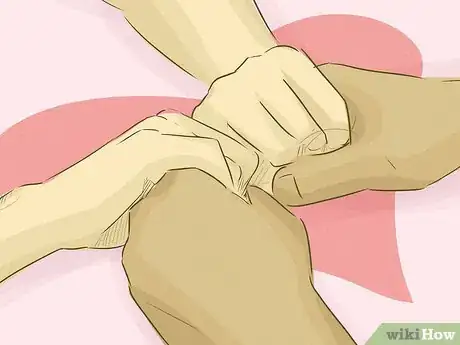This article was co-authored by Omar Ruiz, LMFT. Omar Ruiz is a Licensed Marriage & Family Therapist and the Owner of TalkThinkThrive, PLLC. With over 11 years of counseling experience, he specializes in helping couples resolve issues and restore intimacy. He has been featured in numerous publications, including The New York Times, Women’s Health, and WebMD. Omar holds a BS in Psychology from Howard University and an MS in Family Therapy from The University of Massachusetts Boston.
There are 8 references cited in this article, which can be found at the bottom of the page.
This article has been viewed 34,052 times.
Most married couples would agree that marriage isn’t easy. In fact, it may be one of the most challenging tasks a person can take on. This is particularly true when one spouse is needy, while the other is more secure. Being too clingy may seem like a good thing, unless you are the recipient and are uncomfortable with your spouse’s behavior. Fortunately, a needy spouse may be able to change their ways by understanding why they are needy, realizing how their behavior may sabotage the relationship, and taking steps to become less needy.
Steps
Taking Steps to Become Less Needy
-
1Build self-worth. Perhaps the most important step in becoming less needy with your spouse is becoming more confident in yourself. In practicing these exercises, you may realize that although you love your spouse, you don’t have to spend every waking moment with them, and that it’s natural to want to do things on your own.
- When you rely on other people for your self-worth, you create this unfortunate sense of codependency towards other people. This can develop into a toxic trait of not feeling fulfilled, especially when you have to depend on someone else for your own level of happiness.
- Work on self-love to boost your self-confidence. Identify the qualities you like about yourself and that you are proud of. For example, perhaps you are an awesome cook. You can emphasize these qualities by going out and providing support for others in your community. In this example, you can take or teach cooking classes.
- Tell yourself every day that you are worth it, you are smart, you are attractive, and you are capable. If you have trouble doing this yourself, seek the help of a therapist.
- Other ways to build self-worth include challenging yourself more often and learning new things. When you overcome a difficult obstacle or develop a new skill you build self-efficacy, which in turn boosts your self-worth.[1]
-
2Pursue your own interests or hobbies. Developing your own life outside of your spouse’s is another way to gain your independence. A hallmark of a healthy relationship is both partners being able to have both separate and mutual interests. Due to your clinginess, you probably already join in on many of your spouse’s activities. So, now you need to consider what you like doing and cultivate some hobbies of your own.
- Do not be afraid to reinvent yourself by identifying interests that you’ve been considering but have held back from because of fear or self-doubt.
- You may also want to go back to school, join a club or group, or find additional ways to meet friends so that you have others to spend time with besides just your spouse.[2]
- Remember—you are an individual with your own individual life. There are plenty of aspects of your routine that your spouse won't be involved with.
Advertisement -
3Allow your spouse to spend time alone. The truth is, everyone needs a little alone time. This doesn’t mean that they don’t necessarily want to spend time with you; rather, they just want to spend some time with themselves. Give your spouse the space and trust they need to be happy and your relationship will likely benefit as a result.
- It may be difficult to give your spouse some room to breathe, but remind yourself that doing so may save your relationship. This clingy behavior isn’t good for you, or for your spouse. Resisting the urge to keep tabs on your spouse at all times and allowing them to have time alone or with friends and family will show your partner that you trust them, which may improve the marriage overall.[3]
-
4Match your partner’s level of affection. When you think about it, most people give out the amount of affection they are comfortable with receiving. If your partner isn’t very affectionate, but you are constantly giving hugs and kisses and demanding it in return, you may start to make them uncomfortable. Instead, mirror their level of affection and attention.
- For example, if you text your partner throughout the day, but only receive one or two from them, start sending out that same amount. Rather than smothering them with affection when they walk through the door, allow them to make the first move. Holding back a little bit may present a challenge initially, but it will likely be worth it in the end.
-
5Seek professional therapy. Clinginess in relationships is often a hallmark of codependency, an unhealthy and one-sided relational dynamic.[4] If you are unable to overcome your neediness, it may help to see a mental health therapist.
- A therapist can work with you to examine your relational patterns, find the origin to clingy behavior, and learn healthier relationship skills. You can find a therapist by asking your family doctor for a referral or by searching for counselors experienced in relationship issues online
Working to Stop Neediness
-
1Get honest with yourself. Those who are clingy often feel insecure, jealous, and lonely. When it comes down to it, these emotions can make the needy person feel simply awful and ultimately, unhappy with the relationship. When they are unhappy, they tend to project this onto their partner. This may cause the more secure partner to leave because they are tired of the way their spouse is treating them.
- Ask your spouse if they think you tend to exhibit these behaviors towards them. For instance, you could say, “Do you think I act jealous or insecure about our relationship? If so, how does that make you feel and why do you think I behave the way I do?”
- Opening up the lines of communication with your spouse helps them to understand that you believe you may have a problem and value their opinion regarding it. You can also work together to brainstorm solutions.
-
2Find ways to stop “suffocating” your partner. In new relationships, it is common for those involved to want to be around each other all of the time. After a while, though, it is natural for that initial spark to begin to fade and those in the relationship start to become more independent.
- If one spouse begins that normal tendency while the other continues to want to spend lots of time together, the other may begin to feel “suffocated.”[5]
- You can overcome this dynamic by spending more time apart. You might say to your partner, "I think I have been suffocating you, and I'm sorry. I didn't realize. I think it will be healthy if we start spending more time with friends or family to give each other some space."
- If being apart from your partner frightens you, fill your social calendar. Schedule gatherings with friends. Pursue your education or complete goals that have been left unfinished. Take up a new hobby or skill.
-
3Show your spouse that you trust them. When needy spouses are constantly checking in with their spouses, forbidding them to go anywhere without them, or berate them with questions when they come home, the more secure spouse may think the clingy spouse doesn’t trust them.[6]
- Overcome the trust issues associated with neediness by using language that demonstrates faith in your partner and the relationship. When your partner goes out with friends, say "Be careful, sweetie. Have a good time." rather than berating them about calling you every hour on the hour.
- Trusting your partner to be away from you and still uphold the values of your relationship is important. Avoid texting or calling them nonstop when you are apart. Don't check their call logs or emails.
Understanding Why You Are Needy
-
1Look at your childhood. When people grow up feeling unloved, they often look for the affection and acceptance they didn’t get during their childhood, from their spouses. If the affection isn’t met, they often believe that the other person doesn’t care about them. Even if it’s something as small as not answering the phone right away, the needy person often becomes paranoid about the relationship and becomes even more clingy.
- If you have siblings or other loved ones who experienced the same type of childhood you did, look at how they behave in relationships. If they are also clingy with their spouses or significant others, you likely are the way you are because your emotional and physical needs were not met as a child.[7]
-
2Determine your self-worth. Needy people tend to have low self-esteem, just as secure people are typically very self-confident. Often, those who are clingy with their spouses are because they are trying to validate themselves. When they don’t receive the love and affection they seek, they often feel even worse about themselves and become even more clingy.
- It’s normal to feel good when your spouse shows affection or tells you they love you. However, if you become crushed or think bad about yourself when they give you less than what you want, it could be because you don’t have enough self-worth.[8]
- It's really important to have your own sense of self-worth, rather than expecting other people to make you fulfilled and happy.
-
3Look at your past relationships. A common trait among those who are clingy in marriages is that they have had failed relationships in the past. Perhaps they were cheated on or were treated poorly. As a result, they become desperate for the love and affection they didn’t receive in the other relationships.
- If a person doesn’t have high self-esteem or didn’t have a loving childhood and are needy with significant others, their clinginess could be the reason why their relationships failed. Then in the next relationship, they display the same type of behavior, and may fail in that relationship, as well. Until the problem is resolved, the person may continue to experience the same types of situations.
- For example, if someone was cheated on in the past, they might become extra controlling with their current spouse as a result of that experience.
Expert Q&A
-
QuestionHow do I stop being clingy and jealous?
 Omar Ruiz, LMFTOmar Ruiz is a Licensed Marriage & Family Therapist and the Owner of TalkThinkThrive, PLLC. With over 11 years of counseling experience, he specializes in helping couples resolve issues and restore intimacy. He has been featured in numerous publications, including The New York Times, Women’s Health, and WebMD. Omar holds a BS in Psychology from Howard University and an MS in Family Therapy from The University of Massachusetts Boston.
Omar Ruiz, LMFTOmar Ruiz is a Licensed Marriage & Family Therapist and the Owner of TalkThinkThrive, PLLC. With over 11 years of counseling experience, he specializes in helping couples resolve issues and restore intimacy. He has been featured in numerous publications, including The New York Times, Women’s Health, and WebMD. Omar holds a BS in Psychology from Howard University and an MS in Family Therapy from The University of Massachusetts Boston.
Licensed Marriage & Family Therapist First, understand that there's a difference between a healthy and an unhealthy level of jealousy — it becomes unhealthy when you're always wanting the other person by your side and restricting them from going anywhere. Evaluate your situation and, if you feel like it's causing anxiety and overwhelming you, try some counseling.
First, understand that there's a difference between a healthy and an unhealthy level of jealousy — it becomes unhealthy when you're always wanting the other person by your side and restricting them from going anywhere. Evaluate your situation and, if you feel like it's causing anxiety and overwhelming you, try some counseling. -
QuestionHow do I stop being insecure in a long-distance relationship?
 Omar Ruiz, LMFTOmar Ruiz is a Licensed Marriage & Family Therapist and the Owner of TalkThinkThrive, PLLC. With over 11 years of counseling experience, he specializes in helping couples resolve issues and restore intimacy. He has been featured in numerous publications, including The New York Times, Women’s Health, and WebMD. Omar holds a BS in Psychology from Howard University and an MS in Family Therapy from The University of Massachusetts Boston.
Omar Ruiz, LMFTOmar Ruiz is a Licensed Marriage & Family Therapist and the Owner of TalkThinkThrive, PLLC. With over 11 years of counseling experience, he specializes in helping couples resolve issues and restore intimacy. He has been featured in numerous publications, including The New York Times, Women’s Health, and WebMD. Omar holds a BS in Psychology from Howard University and an MS in Family Therapy from The University of Massachusetts Boston.
Licensed Marriage & Family Therapist Try to have a scheduled time for your conversations, so you both know what to expect. Also, leave in-depth conversations out of email and text messages, since that can cause some friction due to miscommunication. This way, you'll probably feel more "seen" and more secure in the relationship.
Try to have a scheduled time for your conversations, so you both know what to expect. Also, leave in-depth conversations out of email and text messages, since that can cause some friction due to miscommunication. This way, you'll probably feel more "seen" and more secure in the relationship.
References
- ↑ http://www.psychalive.org/self-worth/
- ↑ http://psychcentral.com/lib/the-10-secrets-of-happy-couples/
- ↑ https://www.psychologytoday.com/blog/the-intelligent-divorce/201208/who-wants-be-needy-six-solutions
- ↑ http://www.webmd.com/sex-relationships/features/signs-of-a-codependent-relationship
- ↑ https://www.psychologytoday.com/articles/200701/suffocating-in-relationship
- ↑ https://www.psychologytoday.com/blog/fulfillment-any-age/201209/why-clingy-partners-cling
- ↑ https://www.2knowmyself.com/why_are_some_people_needy
- ↑ http://www.lifehack.org/articles/communication/9-ways-less-clingy-your-relationship.html
About This Article
It’s natural to feel a bit needy sometimes, but if your spouse needs a little more space, you can adapt to it with a few simple changes. If you get bored or restless on your own, take up a new hobby to keep you occupied. You should also encourage your partner to spend a little time doing their own thing. This might be hard at first, but spending time apart can actually strengthen your relationship and bring you closer together. Pay attention to how much affection your partner gives you and try to match that. For example, if they like a cuddle in the evening but don’t seem too keen on being affectionate during the day, let them have a little space in the daytime, and you’ll enjoy your evening even more. For more tips from our Relationship co-author, including how to deal with trust issues, read on!






































































